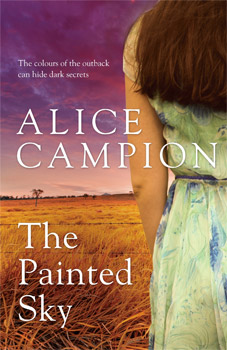The Painted Sky

The Painted Sky
Alice Campion is the pseudonym for five members of a Sydney book club who challenged themselves to write a -21st Century Thorn Birds'. The result is a captivating rural novel, brimming with romance, mystery and suspense.
Nina never knew what happened to her father, the celebrated artist Jim Larkin. One minute he was her devoted dad, the next he'd disappeared without trace. Seventeen years later, she's still haunted by the mystery.
Until a call from outback Wandalla changes everything.
At first, Nina's inheritance of a waterless property and a farmhouse stuffed with junk seems more like a burden than a gift. But this was her father's childhood home – and possibly her last chance to discover the truth.
So what is the local solicitor, Harrison Grey, not telling her as he hands over the keys? Why does the area's wealthiest resident, Hilary Flint, seem to hate her so much? What is the significance of the gold locket with cryptic engravings that Nina always wears?
And why, on top of everything, is she inexplicably drawn to her soon-to-be-married neighbour, Heath Blackett?
The Painted Sky is the work of five members of a Sydney book club, writing under the collective pseudonym Alice Campion:
Denise Tart is a marriage celebrant with a background in performance and event management. She has written for the theatre and business, but now mainly pens meaningful and romantic ceremonies. Denise loves a good yarn.
Jenny Crocker looks forward to rainy weekends and their potential for endless guilt-free reading. Jenny has been a journalist, public relations manager, non-fiction author and now manages awareness and education campaigns.
Jane St Vincent Welch spent her childhood on an isolated rural property in the New England region of NSW. Jane now works in Sydney as a documentary editor, and enjoys telling stories in pictures and words. She would like to sit on a verandah one day and just paint.
Jane Richards is a senior editor and journalist at Fairfax Media. She loves mysteries and secrets.
Madeline Oliver's reading group, The Booksluts, germinated the writing group that created this book. Madeline is a Sydney writer who yearns to be under a big sky. She's working on a young adult novel.
The Painted Sky
Author: Alice Campion
ISBN: 9780857984852
RRP: $32.99
Interview with Denise Tart (one fifth of Alice Campion)
Question: Why did you decide to write under the Alice Campion pen-name?
Denise Tart: Right from the start, we realised it would be too clunky to list five names on the cover or spine of a book! And, who would remember all those names? We had some hilarious pen-names as we wrote The Painted Sky. Beth Kloostus (she's Dutch) is an anagram of The Booksluts (our book club name). We used to make restaurant reservations in her name. We presented the manuscript to Random House in the name of Khira Hussey (we scouted for a foreign word that meant 'book" and sounded like a female name – Khira is 'book" in Belarusian! And we all know what a 'hussey" is. Thankfully, cooler heads prevailed and our publisher guided us. She suggested we come up with a friendly, Australian-sounding first name and a surname starting with 'C" because, apparently that is about eye level on most book shop shelves.
Question: How difficult was it to write with four other authors?
Denise Tart: Surprisingly easy. For most of the writing period, we didn't set deadlines around finishing the The Painted Sky, so we were able to take it at a pace that suited everyone. This meant, we had plenty of time for in-depth, sensitive sessions where we would go through each other's writing and make suggestions for improvements. We enjoyed meetings in each other's homes, pubs, libraries and many weekends away, where we would review work and workshop plot direction, characters and themes. We would plan the scenes in readiness for the next writing cycle.
While scenes were started by various individuals, they were each re-worked on many occasions, often by every other writer. We're told now that this has resulted in a pretty seamless text, that speaks with one voice.
It was remarkable to be in a position to soak up all the wisdom, talent and support that working in a group brings to a project. There's nothing like be answerable to others to get the job done!
Alice Campion is as busy as ever. There are two new novels on the way; one set in tropical North Queensland in the early twentieth century, being written by three of us, and the other set in the Mudgee area, by another two. The group of three has also published an eBook How to Write Fiction as a Group with the aim to foster an online support community for group fiction writing – www.groupfiction.net
Question: What was the best part about creating the character of Nina Larkin?
Denise Tart: We all grew to love Nina like a daughter. Once we hit on her vulnerabilities, we watched her work through these and mature in front of us. She really took off on her own. It was satisfying to guide her trajectory from a party girl with no real life-plan, to a woman of substance and direction. She eventually finds her place, her purpose and her mob. I think that happens often to women at the seven-year turning points and that is certainly the case for 28-year-old Nina. And, of course, there was also her love-life to navigate – that was lots of fun too!
Question: There are several issues raised in this book. Was this deliberate or did the story evolve this way?
Denise Tart: Most of the issues grew as we wrote the story. We knew from the beginning that we would feature some Aboriginal characters. We figured if we were going to explore characters in that part of New South Wales (around Bourke) it would be wrong not to – they represent a good percentage of the population. On the other hand, we realised there are sensitivities around portrayal and appropriation by non-Aboriginal storytellers. I hope we hit the right tone. We consulted Aboriginal locals are told that our Koori characters and scenes are quite truthful, so we're pretty happy with that. We also explore issues around honesty and the damage that secrets in families, and elsewhere, can cause. This theme resonates through various strands of the story. Sustainable farming found us on our research trip out west, and so did the decaying state of so many beautiful, old buildings. Homosexuality in the bush was a somewhat more conscious inclusion, but even that seemed to evolve naturally in one of our characters, without our bidding. The people of the outback are more complex, and often more sophisticated than many city-dwellers give them credit for. Remember, the same proportion of people of every persuasion is born in Wandalla as in Woolloomooloo!
Question: Can you tell us about the research you did, prior to writing The Painted Sky?
Denise Tart: Most of the Alices had had some understanding of life west of the Blue Mountains. Jane S grew up on an isolated rural NSW property, I spent my childhood in Wagga Wagga, Jenny in Armidale, Maddy in Tasmania and some of Jane R's relatives come from Coonamble way. However, when we started The Painted Sky we just jumped straight in and conducted research as and when the need arose. Almost immediately, we had questions around farming, transport, communication, water...and on it went.
We'd been working on the novel for ten months only to realise that the only way to get the real flavour of Wandalla – was to go to Wandalla. Once there, we found out just how much we didn't know. We met many generous and genuine locals, whose stories and characters leapt on to our pages. We stayed on farms and shared family meals in Bourke, Bokhara Plains, Walgett and Louth.
In Brewarrina, a local elder (and family friend) made tea for us from the kettle that permanently boils on her wood stove and shared stories with us that I will never forget. We were transported into 'Moira's" kitchen and later we strolled in her backyard – the citrus trees, outhouse and hills hoist all ended up in The Painted Sky. We walked in Nina's shoes across dry paddocks on farms and into homes and pubs.
Around Bourke, we took in Gundabooka National Park, the once-mighty Darling River, the Bourke Bowlo and indigenous community radio. In Brewarrina, it was the aboriginal cultural museum, the fish traps and the local school. In Lightning Ridge, it was the artesian baths, the Men's Shed and the unforgettable hours spent with the late Roy Barker, then in his 80s, at his 'Keeping Place". Near Louth it was a huge camp fire under a million stars, towering gum trees and spooky, abandoned buildings.
Interview by Brooke Hunter
MORE



